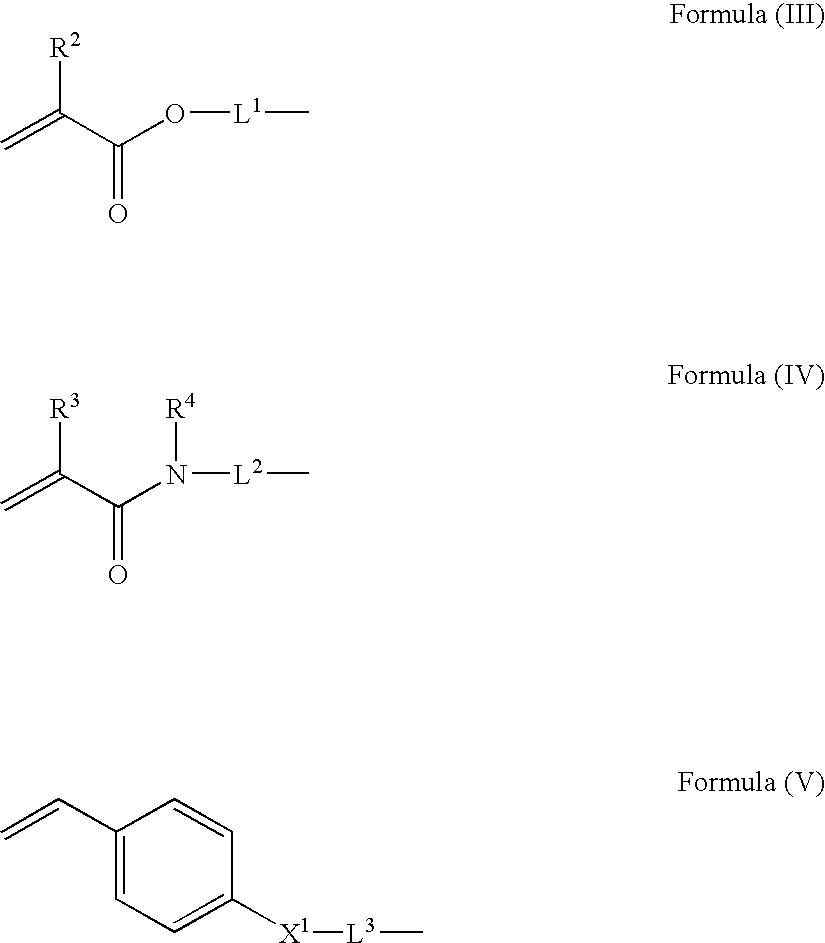Isocyanate composition, microcapsule and production method thereof, and recording material
a technology of isocyanate and composition, applied in the direction of photosensitive materials, instruments, thermography, etc., can solve the problems of loss of above reactivity, recording materials have problems regarding storability and reliability of recorded images, and unsatisfactory coloring easily, etc., to achieve excellent properties, clear color, and high heat sensitivity
- Summary
- Abstract
- Description
- Claims
- Application Information
AI Technical Summary
Benefits of technology
Problems solved by technology
Method used
Image
Examples
synthetic example 1
[0171]18.8 parts of exemplified compound 1-1, compound represented by Formula (I), was dissolved in 18 parts of ethyl acetate. 0.105 parts of 2-mercaptoethanol was added to the resultant solution. Polymerization was carried out in the presence of 0.04 parts of 2,2′-azobis(2,4-dimethylvaleronitrile) (V-65™ manufactured by Wako Pure Chemical Industries, Ltd.,), serving as a polymerization initiator, in a surrounding temperature of 70° C. for 7 hours under nitrogen flow. After the completion of the polymerization, the resultant polymer solution was added to 300 parts of hexane to precipitate a product. As a result, 17.5 parts of exemplified polymer 2-1 was produced by radical polymerization of the above-mentioned compound 1-1 (yield: 93%).
synthetic example 2
[0172]18.8 parts of exemplified compound 1-1, compound represented by Formula (I), and 5 parts of N-ethylacrylamide were dissolved in 20 parts of ethyl acetate. 0.105 parts of 2-mercaptoethanol was added to the resultant solution. Polymerization was carried out in the presence of 0.04 parts of 2,2′-azobis(2,4-dimethylvaleronitrile) (V-65™ manufactured by Wako Pure Chemical Industries, Ltd.,) serving as a polymerization initiator at a surrounding temperature of 70° C. for 7 hours under nitrogen flow. After the completion of the polymerization, the resultant polymer solution was added to 300 parts of hexane to precipitate a product. As a result, 22.3 parts of exemplified polymer 2-15 was produced by radical polymerization of the above-mentioned compound 1-1 and N -ethylacrylamide (yield: 94%).
synthetic example 3
[0173]17.2 parts of exemplified compound 1-1, compound represented by Formula (I), and 4 parts of N-ethylacrylamide were dissolved in 20 parts of ethyl acetate. 0.102 parts of 2-mercaptoethanol was added to the resultant solution. Polymerization was carried out in the presence of 0.035 parts of 2,2′-azobis(2,4-dimethylvaleronitrile) (V-65™ manufactured by Wako Pure Chemical Industries, Ltd.,) serving as a polymerization initiator at a surrounding temperature of 70° C. for 7 hours under nitrogen flow. After the completion of the polymerization, the resultant polymer solution was added to 300 parts of hexane to precipitate a product. As a result, 20.1 parts of exemplified polymer 2-16 was produced by radical polymerization of the above-mentioned compound 1-1 and N-ethylacrylamide (yield: 95%).
PUM
| Property | Measurement | Unit |
|---|---|---|
| temperature | aaaaa | aaaaa |
| glass transition temperature | aaaaa | aaaaa |
| glass transition temperature | aaaaa | aaaaa |
Abstract
Description
Claims
Application Information
 Login to View More
Login to View More - R&D
- Intellectual Property
- Life Sciences
- Materials
- Tech Scout
- Unparalleled Data Quality
- Higher Quality Content
- 60% Fewer Hallucinations
Browse by: Latest US Patents, China's latest patents, Technical Efficacy Thesaurus, Application Domain, Technology Topic, Popular Technical Reports.
© 2025 PatSnap. All rights reserved.Legal|Privacy policy|Modern Slavery Act Transparency Statement|Sitemap|About US| Contact US: help@patsnap.com



